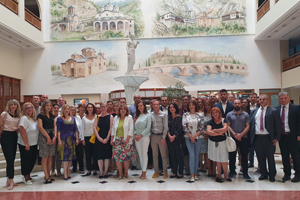
UNECE, the World Bank and the European Commission have joined forces with the Customs service of North Macedonia and the other Western Balkan countries to improve the region’s trade connectivity with the European Union. Six Western Balkan countries have requested a World Bank project in support of building national Single Window systems, which simplify import and export transactions by making it easier to input all regulatory and commercial information at a single electronic point. Such systems streamline cross-border data exchange, reducing bureaucracy and making it easier for businesses to engage in international trade transactions.
Supporting this objective, a workshop held in Skopje from 4 to 5 September 2019 enabled experts from the Western Balkans and the international community to identify the international standards, notably UN/CEFACT standards, and tools to support the Single Window systems for export, import and transit clearance.
Building on the countries’ progress made in this area since 2008, when the first Single Window system called EXIM was launched with assistance from UNECE and other agencies in North Macedonia, the workshop strengthened the network of experts from the Western Balkan countries, UNECE, UN/CEFACT, the European Commission, broadening it to other actors: the World Bank, the Central European Free Trade Agreement (CEFTA), and the Systematic Electronic Exchange of Data (SEED) project. The work on data harmonization was linked to the upcoming World Bank-supported Single Window and Customs modernization project, together with other developments and tools including the EU’s Customs Data Model and CERTEX projects for integrating regulatory certificates in the Single Window.
The workshop discussed ways for including these tools in the relevant Single Window projects. A specific goal was to review international standards for data and document exchange and data modelling that could be included in the blueprints for the national Single Window projects in the Western Balkan countries. Interoperability of Single Window and other IT systems facilitating international trade in the broader European space can only be achieved by using the same semantic standards for data sharing in the regulation of international trade.
Mr. Gjoko Tanasoski, Director General of the Customs Administration of North Macedonia, noted that “the workshop was an excellent opportunity for North Macedonia and the other Western Balkan countries to get acquainted with UNECE tools and recommendations for data harmonization and trade facilitation. Innovative ideas and important standards were presented, and they shall find a useful place in the next update and improvement of EXIM, the North Macedonian Single Window”.
With this system, North Macedonia remains a pioneer in implementing the Single Window in the region, having amassed a critical mass of experience and implementation skills for the Single Window. Ms. Sue Probert, Chair of the UN Centre for Trade Facilitation and Electronic Business, (UN/CEFACT), stressed that international standards are at the basis of such an instrument of information exchange facilitation as the Single Window. She noted that standards and their implementation are a moving target and the approach of North Macedonia of developing the local capacity to implement and constantly update their use, working with the relevant international organizations, is the right approach. Ms. Alina Antoci from the World Bank noted that it was very useful to hear the discussion at the workshop, notably for the future development of the Single Window blueprints for the Single Window projects.
Overall, the workshop stressed that European integration was at the centre of attention of the countries and the international projects. The participants highly appreciated the practical training exercise provided by UN/CEFACT and European Commission experts on aligning data to the European and international standards. These exercises and support for the establishment of a National Trade and Transport Facilitation Monitoring Mechanism in North Macedonia will be the subjects of follow-up events in this initiative.